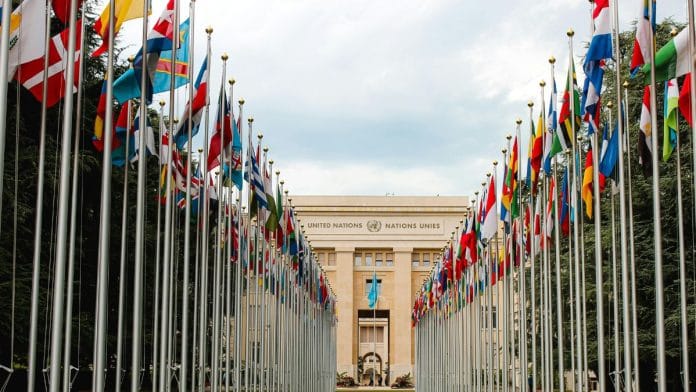New Delhi: The son of a Kenyan diplomat, accused of assaulting a 5-year-old girl on a school bus, has allegedly fled the country, according to the girl’s parents, despite at least three FIRs filed against him and just days before a hearing in the Delhi High Court.
The incident allegedly took place in August last year. The accused, a Class 12 student, was suspended after protests by the girl’s parents and those of other students in February.
A month after the incident, Delhi Police registered an FIR against the diplomat’s son under Section 75(2) (sexual harassment) of the Bharatiya Nyaya Sanhita (BNS) and Section 10 (aggravated sexual assault) of the Protection of Children from Sexual Offences (POCSO) Act on the basis of a complaint filed by the minor’s parents. Since then, two other FIRs under similar sections have been lodged against him, police sources earlier told ThePrint.
Last month, the parents of the survivor also filed a petition in the Delhi High Court, calling for the accused’s diplomatic immunity to be revoked, enabling Indian authorities to prosecute him under domestic laws. The next hearing is scheduled for 7 April.
However, the police have yet to take action, given that the accused is not subject to the jurisdiction of local courts on account of diplomatic immunity. Under international law, it protects foreign officials from arrest or prosecution for alleged crimes committed in the host country. This can range from unpaid parking tickets and shoplifting to sexual assault and even murder. Law enforcement in host countries cannot even question the accused.
ThePrint explains diplomatic immunity, how it applies, and legal precedents.
Also Read: Kenyan diplomat’s son accused of sexually assaulting minor has left the country, girl’s parents say
What does diplomatic immunity cover
Diplomatic immunity is enshrined under the Vienna Convention on Diplomatic Relations, 1961. It has been ratified by all 193 members of the United Nations, including India.
It recognises ambassadors, heads of mission, envoys, ministers plenipotentiary, and chargés d’affaires as diplomatic representatives.
The convention states that diplomats and their families “shall enjoy immunity from the criminal jurisdiction of the receiving State”. This allows diplomats to carry out their duties without fear of arrest, prosecution, or interference. They can negotiate sensitive issues and represent their country’s interests without the risk of political retaliation.
It also says that diplomatic agents are not required to give evidence as witnesses.
Moreover, diplomatic missions are exempt from taxes and customs duties.
Even diplomatic pouches—which are used to carry official correspondence and range from a locked briefcase to a large sealed crates—are completely off-limits for inspection, no matter what’s inside. The cargo in them, deemed sensitive, cannot be searched or seized.
But these privileges can be prone to misuse. In 2020, for instance, customs officials in Kerala found 30 kg of smuggled gold in a diplomatic package addressed to the UAE Consulate in Thiruvananthapuram.
Consular officers also have diplomatic immunity but of a more limited kind.
While they have immunity from prosecution for actions performed as part of their official duties, unlike diplomats, they do not have personal inviolability—this means their immunity is primarily related to their official functions.
Declaring them ‘persona non grata’
A diplomat’s immunity can only be revoked by their home country. If a diplomat commits a serious offense, the host country’s only option is to declare them ‘persona non grata,’ meaning he/she is no longer welcome in the host country and is usually expelled. Countries use this status for misconduct, security threats, or as retaliation in diplomatic disputes.
For example, in July 2024, Russia declared a Romanian diplomat ‘persona non grata,’ which was seen as retaliation for Romania expelling a Russian diplomat earlier. In September 2023, it expelled two US diplomats, claiming their activities violated diplomatic norms.
Similarly, in 2023, China expelled a Canadian consul from Shanghai. This was in response to Ottawa’s earlier expulsion of a Chinese diplomat accused of intimidating a Canadian MP.
Diplomats can only be prosecuted if their home country waives immunity, but history shows that it rarely happens—even in high-profile cases.
A recent example is the October 2024 diplomatic row between Canada and India. The Canadian government accused India’s High Commissioner and five other diplomats of being involved in a criminal conspiracy involving homicide and extortion against India’s critics in Canada.
Despite the serious allegations, diplomatic immunity protected them from legal action. Canada expelled the diplomats, but prosecution can only happen if India chooses to waive their immunity—an extremely unlikely move.
Abuse of diplomatic immunity
There have been several incidents when diplomats have misused diplomatic immunity to escape prosecution.
For example, in 2015, Saudi Arabian diplomat Majed Hassan Ashoor, who was accused of raping two Nepalese women, left India without facing trial by invoking his diplomatic immunity.
This is also true for less serious cases. By 2022, for instance, United Nations representatives and other diplomats owed $15 million in New York City parking fines and $190 million in unpaid London tolls, with the US embassy alone racking up $14.6 million.
Varnika Dhawan is an intern with ThePrint
(Edited by Sanya Mathur)
Also Read: Diplomatic row has India & Canada invoking Vienna Convention. All about key international agreement







The Modi government is spineless – that’s the bitter truth.
Was not Ms. Devyani Khobragade (IFS posted in USA) arrested right outside her son’s school and handcuffed in public?
If Ms. Khobragade could have been treated in this manner, what exactly stopped the Indian government from arresting the Kenyan diplomat’s son?
It’s quite simply a case of cowardice – to hide which “diplomatic immunity” is an effective excuse.